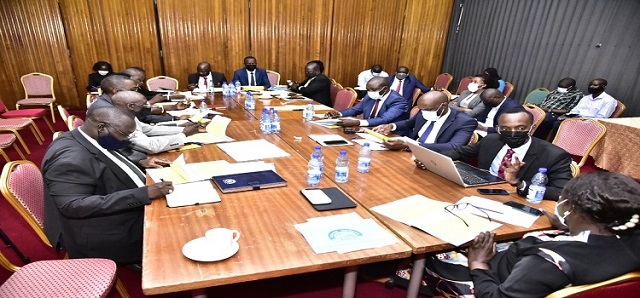
Kampala, Uganda | THE INDEPENDENT | The Uganda Free Zones Authority has asked Parliament’s Finance Committee to consider adding Shs29.5 billion to its budgetary allocation for the financial year 2022/2023.
According to the Authority’s Executive Director, Hez Kimoomi Alinda, Shs28.24 billion of the additional funding will cater for the completion of the Entebbe International Airport Free Zone which he says will in turn improve the value of Uganda’s exports.
“The money will be used for construction works to provide industrial infrastructure that will facilitate export-led growth,” said Alinda.
Part of the extra funding is to cater for a review of the Free Zones Act, 2014, where amendment of the law on Special Economic Zones will enhance the global competitiveness of the scheme.
The Authority is expected to receive Shs13.5 billion that will be utilised for among others, the Entebbe Airport Rehabilitation Phase 1 including pushing of construction works at the International Airport Free Zone to 60 per cent.
Alinda made the request while leading a team that appeared before the Finance Committee chaired by Deputy Chairperson, Jane Pacuto.
He told the Committee that the Free Zones Authority lacked strategic industrial land for the development of public free zones across the country. He revealed that the Lands Ministry has declined to transfer a title for 109 acres of land at Buwaya in Wakiso district to the Authority.
“We acquired this land and paid for it but we do not know why they have refused to transfer the title to us. I request the Committee to intervene and solve the impasse so that we can progress in implementing Uganda’s export-led industrialization strategy,” Alinda said.
Kabula County MP, Enosi Asiimwe tasked the Authority to present a detailed bills of quantities on the Entebbe International Airport Free Zone, ‘…to give the Committee a good picture of why you need an additional budget allocation of Shs28 billion’.
Free Zones are designated areas in Uganda where duty free goods are stored, manufactured and or processed for export.
They are internationally recognised formations for driving the East African Community and Uganda export-led industrialisation strategy, where in Uganda, they account for US$1.25 billion, which is 23 per cent of Uganda’s export earnings.
 The Independent Uganda: You get the Truth we Pay the Price
The Independent Uganda: You get the Truth we Pay the Price



